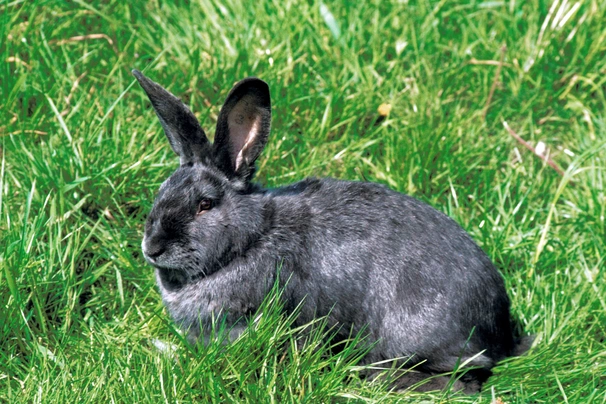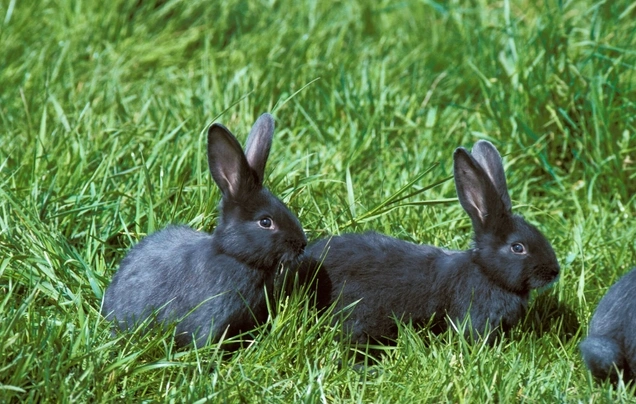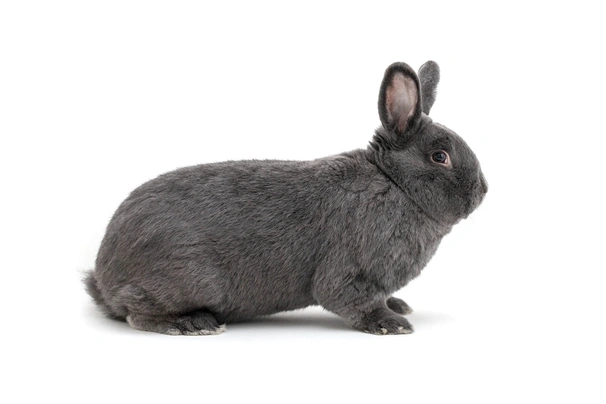Vienna
Introduction of the Vienna
The Vienna is an old breed that originated in Austria and has only recently made its presence felt in the UK. The Vienna has soft, silky fur that is accepted in white, agouti and a deep slate blue that lightens to a paler grey on the underside.
The Vienna generally weighs between 8-12lbs.
History of the Vienna
The Vienna was shown in the late 19th Century in Austria and is the result of crossing the Flemish Giant with older Moravian breeds, dove grey versions of which were highly prized by breeders of the time.
Being a medium sized, well muscled animal the Vienna made an excellent meat rabbit and it was also a prolific breeder so supplies were always plentiful. It’s fine coat also made it useful to the fur trade so the breed was popular for those with more commercial interests, as well as those wanting to breed for the show ring.
Appearance of the Vienna
- Main colourways: white, agouti (also known as coloured) or slate blue
- Average weight: 3.6 – 5.4kg
The Vienna is a medium sized rabbit with a cylindrical body that’s well muscled. The chest is deep and the back follows a line from the base of the neck to a rounded rump. The legs are of medium bone and the head is prominent and bold.
Like the rest of the body, the ears are robust, well furred and of a significant length that’s in proportion to the rest of the body. The coat is of a medium length and is silky and lustrous with lots of guard hairs.
The white variety of Vienna has blue eyes, while the blue or coloured type has black or hazel eyes.
Temperament of the Vienna
The temperament of any rabbit depends very much on how it has been raised and handled, and also on its lines. Any reputable breeder will ensure their kits are well handled, placid and used to humans and possibly cats and dogs too.
Despite a tendency to be laid back and generally docile, because it’s a reasonably large rabbit the Vienna is not a good choice for first time or inexperienced handlers. Because of their size they must be handled and picked up with care and as they carry a lot of weight at the rear end, the hind quarters and rump must be adequately supported during carriage or spinal injuries can occur.
Rabbits are not keen on being picked up anyway, and if he’s picked up incorrectly he can struggle. Rabbits are much stronger than they look and one that panics can cause damage to both itself and the handler.
Health of the Vienna
There are a number of prevalent conditions that affect all rabbit breeds and types, but the larger animals can be badly affected by sore hocks and flystrike.
Larger breeds must have solid floors or resting boards in their hutches because wire floors can cause the bristly hairs protecting the back feet to wear off and reveal the delicate skin of the hocks. The skin can easily break on repeated contact with wire or mesh, creating open wounds. This condition is known as ‘sore hocks’ and can be extremely painful. The injuries might even become infected and require the attentions of a vet. Soiled and urine-soaked bedding can also cause sore hocks.
All rabbit breeds can experience problems with their teeth. The teeth of rodents grow all of the time and because of this rabbits need to be given a diet that will help keep their teeth worn down. Gnaw toys will also help with this. Good hay and lots of green vegetables and leaves such as kale, cabbage, carrot tops and spring greens can form the basis of his diet and will provide fibrous material that will require lots of chewing, which will help keep dental issues at bay. Rabbits can also be offered leaves from the garden such as dandelions and clover, providing they haven’t been treated with any chemicals.
As well as providing food and items that the rabbit can use to help keep his teeth in good condition, an owner should also perform visual checks of the teeth once a week.
A rabbit that becomes soiled with its own faeces and urine is susceptible to flystrike – particularly in warmer weather when lots of flies are present. Larger or overweight animals that have difficulty grooming thoroughly are most at risk.
Flies are attracted to the soiled areas of fur, which are usually around the hind quarters, and will lay eggs there. The maggots will then burrow under the skin, causing open wounds which will certainly require veterinary attention. Again, it’s worth checking your rabbit visually every couple of days if the weather is warm and flies are present.
It’s vital that all rabbits are treated for ticks, worms and fleas and they should also be vaccinated against myxomatosis and Viral Haemorrhagic Disease (VHD), both of which are very infectious and are usually fatal.
Caring for the Vienna
The Vienna can be kept indoors or out, but his basic needs must be met in order to keep him healthy and happy. Rabbits should always be protected from extreme extremes of temperature, as well as dust and pollution. Rabbits can easily develop respiratory problems and an environment that is dirty, too hot or too cold can cause or exacerbate problems.
Any hutch should be placed in a sheltered spot or in a large shed and must be weatherproof. For a rabbit like the Vienna it must be large enough to allow him to hop around and stand on his hind legs and it should also come with a covered area for nesting. Any substrate used to line the hutch should be removed and replaced once a week, with toilet areas removed every couple of days.
If you’re rabbit is going to live outdoors, think carefully about investing in a pair, as they will be much happier with company than without. If you’re planning on having a house rabbit he should also have a secure, quiet area he can go to relax that cannot be accessed by people or other pets. He can be taught to use a litter tray and must be kept away from wires and cables, as well as anything else that shouldn’t be chewed.
Regardless of whether he’s going to be an indoor or outdoor rabbit he will need regular access to the outdoors. A large run or secure area of garden he can explore and stretch his legs will be much appreciated. Be careful not to leave him unsupervised and ensure the area is safe from predators. Because of their delicate respiratory systems, rabbits should not be left out in bad weather.
He should be fed green vegetables, good hay and high-quality pellets according to manufacturer’s instructions to avoid weight gain, and he should have constant access to clean, fresh drinking water.

Black female Rabbit
£35


